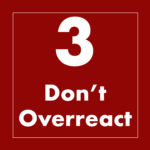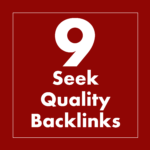The start of a new year is a time when we resolve to get our acts together and finally accomplish all the important things we promised ourselves we would in our business and personal lives last January. The problem we have is that simply resolving to do things differently doesn’t work. People who study such things say that four out of five new year’s resolutions are forgotten by mid-February, which to us sounds like a pretty conservative estimate. The key to changing what we do and making it stick these experts say, lies in changing our habits.
Whether you’ve resolved to restore your organization’s online reputation after a crisis, immunize it against future problems or build an online reputation your competitors envy, you’re unlikely to get very far on resolutions alone. We’ve been studying the science of habit formation and applying it to our work helping organizations build, protect and restore their online and offline reputations for a long time. So, in the spirit of a new year, we are pleased to share 12 essential habits to help you build a stronger, healthier online reputation in 2022 that stands the test of time.
 Leaving the picture Google paints of your business completely to chance is a bad idea. You wouldn’t think of managing your business without a carefully thought-out plan. At least we hope not. Your online reputation deserves the same thoughtful, focused planning. Of course, simply having a plan isn’t enough. The magic is in consistent execution—sticking to your plan, reviewing results regularly and having the discipline to adjust for unexpected opportunities and challenges without veering totally off-course.
Leaving the picture Google paints of your business completely to chance is a bad idea. You wouldn’t think of managing your business without a carefully thought-out plan. At least we hope not. Your online reputation deserves the same thoughtful, focused planning. Of course, simply having a plan isn’t enough. The magic is in consistent execution—sticking to your plan, reviewing results regularly and having the discipline to adjust for unexpected opportunities and challenges without veering totally off-course.
 How will you know if your plan is actually working? By setting clear, measurable goals right from the start. Forget “vanity metrics” such as likes and downloads, which only boost egos, not business. Focus instead on goals that connect your online reputation efforts to your organization’s business objectives. If the objective is to double widget sales by the end of 2022, setting a goal of doubling traffic from qualified buyers who visit your site and click to request a price quote will bring in revenues a lot more reliably than getting twice as many likes on your social posts.
How will you know if your plan is actually working? By setting clear, measurable goals right from the start. Forget “vanity metrics” such as likes and downloads, which only boost egos, not business. Focus instead on goals that connect your online reputation efforts to your organization’s business objectives. If the objective is to double widget sales by the end of 2022, setting a goal of doubling traffic from qualified buyers who visit your site and click to request a price quote will bring in revenues a lot more reliably than getting twice as many likes on your social posts.
 When online reputation is threatened, the stress can create a dangerous sense of urgency to “do something.” Letting emotions guide your response is a sure way to draw unwanted attention to negative content that few people would see otherwise. Just ask Barbra Streisand, whose lawyers’ efforts to suppress photos of her oceanside home in an online database had the opposite result and gave rise to what’s known as the Streisand Effect. Steer clear of consultants who promise to make troubling search results magically disappear and often create more online damage in the process.
When online reputation is threatened, the stress can create a dangerous sense of urgency to “do something.” Letting emotions guide your response is a sure way to draw unwanted attention to negative content that few people would see otherwise. Just ask Barbra Streisand, whose lawyers’ efforts to suppress photos of her oceanside home in an online database had the opposite result and gave rise to what’s known as the Streisand Effect. Steer clear of consultants who promise to make troubling search results magically disappear and often create more online damage in the process.
 Successfully shedding online reputation baggage starts with good nutrition, not a miracle diet. Feeding Google a steady diet of helpful, well-written content that people want and search engines value does more than boost your search rankings. The more valuable, sought-after information you deliver, the harder you make it for negative search results to gain a foothold and the better protected your online reputation against damage. But beware, quality is more important than quantity. Flooding search engines with low-quality, mass-produced articles, a tactic of many online reputation repair consultants that is easily detected by search engine algorithms, can have serious long-term consequences for your organization’s online reputation and search results.
Successfully shedding online reputation baggage starts with good nutrition, not a miracle diet. Feeding Google a steady diet of helpful, well-written content that people want and search engines value does more than boost your search rankings. The more valuable, sought-after information you deliver, the harder you make it for negative search results to gain a foothold and the better protected your online reputation against damage. But beware, quality is more important than quantity. Flooding search engines with low-quality, mass-produced articles, a tactic of many online reputation repair consultants that is easily detected by search engine algorithms, can have serious long-term consequences for your organization’s online reputation and search results.
 Search engine algorithms are designed first and foremost to answer people’s questions, not to help you make more money or drive more traffic to your website. If you think about your audience’s biggest questions and challenges and deliver thoughtful content that answers them and solves their problems, your content will naturally rank higher. You need to figure out what questions your audience is asking in order to answer these inquiries via your content. Thankfully, there’s no shortage of tools to help you figure out the keywords and phrases you have the best chances of ranking for. Google Keyword Planner and Moz are two of our favorites, but most offer free trials so you can explore your options before committing. This is not to suggest that you can ignore the more technical aspects of SEO entirely. But if you focus on writing for humans first and search engines second, you’ll be way ahead of the game, and your competition, too.
Search engine algorithms are designed first and foremost to answer people’s questions, not to help you make more money or drive more traffic to your website. If you think about your audience’s biggest questions and challenges and deliver thoughtful content that answers them and solves their problems, your content will naturally rank higher. You need to figure out what questions your audience is asking in order to answer these inquiries via your content. Thankfully, there’s no shortage of tools to help you figure out the keywords and phrases you have the best chances of ranking for. Google Keyword Planner and Moz are two of our favorites, but most offer free trials so you can explore your options before committing. This is not to suggest that you can ignore the more technical aspects of SEO entirely. But if you focus on writing for humans first and search engines second, you’ll be way ahead of the game, and your competition, too.
 Trying to rank for the shortest and most obvious keywords for your product or service can be an exercise in futility. There’s just too much competition. Instead, try fishing where your competition isn’t by optimizing your content for long-tail keywords—multi-word phrases that home in on precisely what your customers are actually searching for. For example, a broad search term like “nursing homes” will invite more competition and therefore be harder to rank for than the more specific “best nursing homes in Tallahassee.” Long-tail keywords generate less traffic per keyword, but more than make up for it by sending visitors to your site who are looking for exactly what you have to offer them and closer to making a final buying decision.
Trying to rank for the shortest and most obvious keywords for your product or service can be an exercise in futility. There’s just too much competition. Instead, try fishing where your competition isn’t by optimizing your content for long-tail keywords—multi-word phrases that home in on precisely what your customers are actually searching for. For example, a broad search term like “nursing homes” will invite more competition and therefore be harder to rank for than the more specific “best nursing homes in Tallahassee.” Long-tail keywords generate less traffic per keyword, but more than make up for it by sending visitors to your site who are looking for exactly what you have to offer them and closer to making a final buying decision.
 Remember, your organization isn’t the only one hustling to enhance its online reputation. Staying a step ahead of your competitors is simple—write more than they do! The more content you create that speaks directly to your audience’s needs and brings them value, the more they will like and share it, the more they will return to your site, and the more trust you’ll earn with people and search engines. Just take a lesson from Marcus Sheridan, whose transformation of a faltering fiberglass pool-installation business into a multimillion-dollar enterprise by simply answering the questions virtually every prospective pool-buyer asks is the stuff of content marketing legend.
Remember, your organization isn’t the only one hustling to enhance its online reputation. Staying a step ahead of your competitors is simple—write more than they do! The more content you create that speaks directly to your audience’s needs and brings them value, the more they will like and share it, the more they will return to your site, and the more trust you’ll earn with people and search engines. Just take a lesson from Marcus Sheridan, whose transformation of a faltering fiberglass pool-installation business into a multimillion-dollar enterprise by simply answering the questions virtually every prospective pool-buyer asks is the stuff of content marketing legend.
 When it comes to building online reputation, delivering quality content your audience values is only half the job. Making sure search engines present it correctly and show it to the right people is the other half. That’s the job of metadata—information hidden in the code of your website to help search engines understand the contents of each page and how to index it. While metadata no longer influences page rankings, at least not directly, it can affect how your page is presented in search listings. With roughly 70 million new blog posts published every month, doing everything you can to make sure that it grabs readers’ attention and is formatted correctly will maximize your click-through rate and drive more traffic to your site. One recent study found that longer meta descriptions resulted in a 36% higher click-through rate—a sizeable edge you definitely don’t want to overlook.
When it comes to building online reputation, delivering quality content your audience values is only half the job. Making sure search engines present it correctly and show it to the right people is the other half. That’s the job of metadata—information hidden in the code of your website to help search engines understand the contents of each page and how to index it. While metadata no longer influences page rankings, at least not directly, it can affect how your page is presented in search listings. With roughly 70 million new blog posts published every month, doing everything you can to make sure that it grabs readers’ attention and is formatted correctly will maximize your click-through rate and drive more traffic to your site. One recent study found that longer meta descriptions resulted in a 36% higher click-through rate—a sizeable edge you definitely don’t want to overlook.
 Quality backlinks serve as a kind of cyber seal of approval that tells search engines that your content is credible and worth linking to. The operative word is “quality.” A single high-quality backlink from a trusted media outlet or the blog of a respected expert or industry influencer can do way more to improve online reputation and awareness of your brand than a thousand low-quality links from sketchy websites bought online. Getting caught buying or manipulating backlinks to improperly boost search ranking carries harsh penalties from Google. Penalties for bad backlinks range from a significant drop in traffic to your entire site being de-indexed, leaving you with virtually no traffic and a steep climb to get back in Google’s good graces.
Quality backlinks serve as a kind of cyber seal of approval that tells search engines that your content is credible and worth linking to. The operative word is “quality.” A single high-quality backlink from a trusted media outlet or the blog of a respected expert or industry influencer can do way more to improve online reputation and awareness of your brand than a thousand low-quality links from sketchy websites bought online. Getting caught buying or manipulating backlinks to improperly boost search ranking carries harsh penalties from Google. Penalties for bad backlinks range from a significant drop in traffic to your entire site being de-indexed, leaving you with virtually no traffic and a steep climb to get back in Google’s good graces.
 As Bill Gates famously pointed out, “Your most unhappy customers are your greatest source of learning.” Stellar reviews about your brand or business may warm your heart, but they don’t teach much and can seduce organizations into a dangerous sense of complacency. Welcome negative reviews for what they really are—precious opportunities to show that your organization is listening, treat people with compassion and understanding, and maintain control of your online reputation rather than leaving it to those who would just as soon destroy it. More than anything, people want to be heard. When you make changes to address people’s complaints, you’re demonstrating that you hear their concerns and care about what they say.
As Bill Gates famously pointed out, “Your most unhappy customers are your greatest source of learning.” Stellar reviews about your brand or business may warm your heart, but they don’t teach much and can seduce organizations into a dangerous sense of complacency. Welcome negative reviews for what they really are—precious opportunities to show that your organization is listening, treat people with compassion and understanding, and maintain control of your online reputation rather than leaving it to those who would just as soon destroy it. More than anything, people want to be heard. When you make changes to address people’s complaints, you’re demonstrating that you hear their concerns and care about what they say.
 The key to a strong and sustainable online reputation is to start building on a solid foundation of “owned media”—content like blog posts, podcasts and videos that you create and have complete control over because they live on your website. Owned content is the fuel your social media channels and email marketing efforts run on and provides added fodder and credibility for your media relations. Create a steady flow of thoughtful content that your stakeholders are looking for, use good SEO hygiene to help search engines deliver it to them, and then amplify it with smart paid, earned and shared media strategies. It’s called the PESO model, and our dear friend and colleague Gini Dietrich invented it.
The key to a strong and sustainable online reputation is to start building on a solid foundation of “owned media”—content like blog posts, podcasts and videos that you create and have complete control over because they live on your website. Owned content is the fuel your social media channels and email marketing efforts run on and provides added fodder and credibility for your media relations. Create a steady flow of thoughtful content that your stakeholders are looking for, use good SEO hygiene to help search engines deliver it to them, and then amplify it with smart paid, earned and shared media strategies. It’s called the PESO model, and our dear friend and colleague Gini Dietrich invented it.
 A healthy online reputation takes constant care and nourishment to thrive. Reputation management is like exercising and eating a healthy diet—you need to make it a habit if you want to see results, and the benefits of all your hard work evaporate quickly if you fall off the proverbial wagon. So be sure to keep up the momentum by making your organization’s online reputation a priority and staying focused on your plan and goals.
A healthy online reputation takes constant care and nourishment to thrive. Reputation management is like exercising and eating a healthy diet—you need to make it a habit if you want to see results, and the benefits of all your hard work evaporate quickly if you fall off the proverbial wagon. So be sure to keep up the momentum by making your organization’s online reputation a priority and staying focused on your plan and goals.
We’d love to hear what you’re going to do to get started, and be sure to keep us posted on your success and the habits that bring you the most value. If you have questions or need a little extra push to get started, just drop us a line. And be sure to download our eBook, Building Crisis Immunity: 5 Strategies to Protect your Reputation and Create a Stronger, More Crisis-Resistant Enterprise, and subscribe for more tips and tools.


Recent Comments